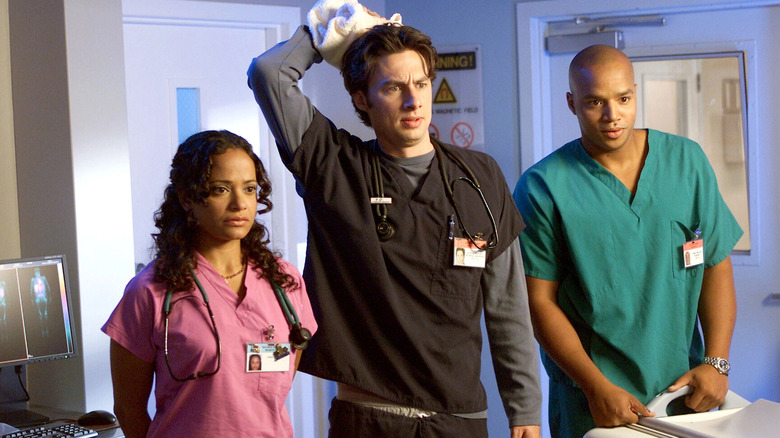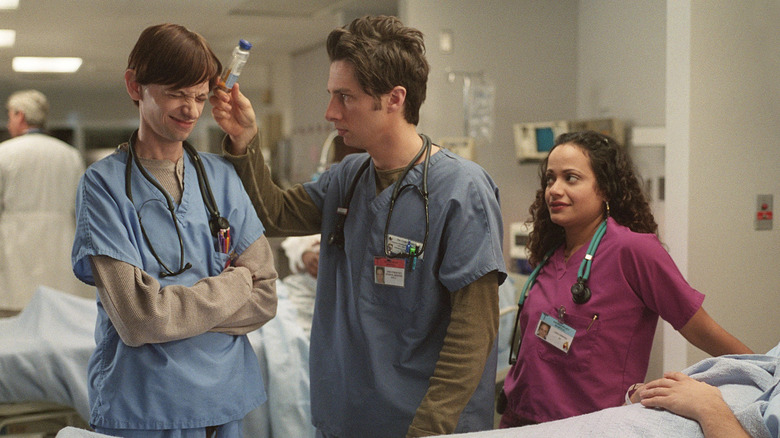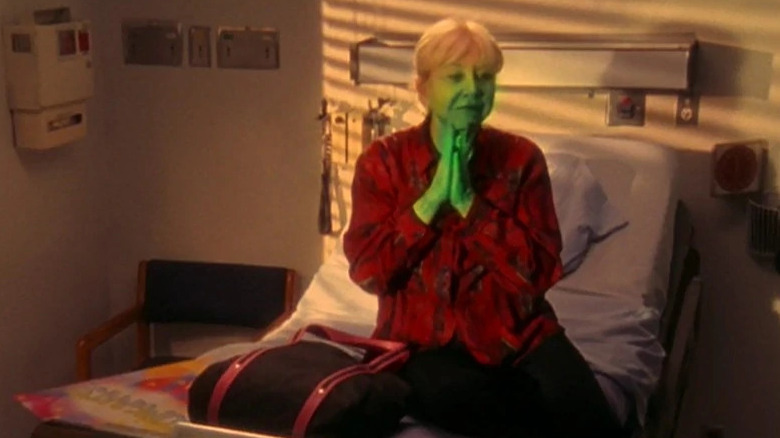The Real-Life Inspiration Behind Scrubs
The 1954 TV show "Medic" helped set the tone for the medical genre in television, stoically announcing before each episode, "Guardian of birth, healer of the sick, comforter of the aged, to the profession of medicine, to the men and women who labor in its cause, this story is dedicated." As television narratives grew more complex, so would the characters, settings, and situations. Most medical shows were serious, hourlong serial dramas.
Then in 2001, the quirky sitcom "Scrubs" flipped the script on the medical genre, focusing on the humor that occurred between lifesaving procedures throughout the halls of the fictional Sacred Heart Hospital. Dubbed as a medical comedy, "Scrubs" used comedy to humanize its doctors in the face of dramatic, sometimes dire circumstances. So it might surprise some to learn that not only is the show rooted in reality, but it's one that actual doctors find more realistic than most modern medical dramas.
J.D. is based on a real person
On the surface, the workplace comedy spits out the traditional sitcom tropes we've come to know and love. But "Scrubs" also brought something else to the table perhaps not seen since the days of "M*A*S*H." Most sitcoms have its third act "D.J. learns her lesson" dramatic moment a la "Full House," but the stakes are raised in "Scrubs." In the show, patients get sick, they die, and the characters feel it. Every episode is not a reset, and we see plot-driven character arcs based on the dramatic moments within the show.
Show creator Bill Lawrence told The Austin Chronicle he found the balance of humor and drama for "Scrubs" from a real source. He watched his friend Jonathan Doris struggle with the realities of medical school. Those struggles would eventually inspire the sitcom's plot. Lawrence said:
"He'd meet us at a bar or at a basketball game, and if he'd be 15 minutes late, sometimes he'd be shaken because he, at a very, very young age, was dealing with people dying and families falling apart on a day-to-day basis."
The protagonist of "Scrubs," J.D. (played by Zach Braff), is named after Doris, whom Lawrence described as "goofy." Doris also served as the medical consultant for the show. Just because the series is funny doesn't mean it can't be real, largely due to input from Doris. So when it comes to realism, Lawrence says he'd put "Scrubs" up against the hourlong serial medical dramas on TV. As it turns out, doctors agree.
Scrubs kind of predicted COVID-19
Although it might be dismissed as a sitcom, "Scrubs" blends comedy and drama the same way "Grey's Anatomy" blends action and drama, and both work hard to show an accurate depiction of what goes on in a hospital. "Scrubs" was even a bit ahead of its time in fearing the quick spread of sickness like COVID-19. In season 5, episode 12, "My Cabbage," a recurring sequence illustrates how easy bacteria and infection can spread, resulting in the eventual death of a beloved patient.
Bill Lawrence takes aim at his hourlong serial drama counterparts, calling out some of the unrealistic situations. He said:
"I used to laugh with [Jonathan Doris] that all these doctor shows, people push open doors, and they look very serious, and they say 'Stat!' and you're an idiot, and I would both be terrified and happy if I woke up in the hospital and you were standing over me going, 'Hey, man, you're going to be fine.'"
The experts seem to agree. When Insider spoke with doctors about the most accurate medical shows on TV, they ranked "Scrubs" as 8/10 for medical accuracy, noting that "doctors found it to be the most relatable depiction of hospital life on television." That goofy medical student friend of "Scrubs" creator Lawrence turned out to be a valuable inspiration for one of television's most accurate medical shows.


